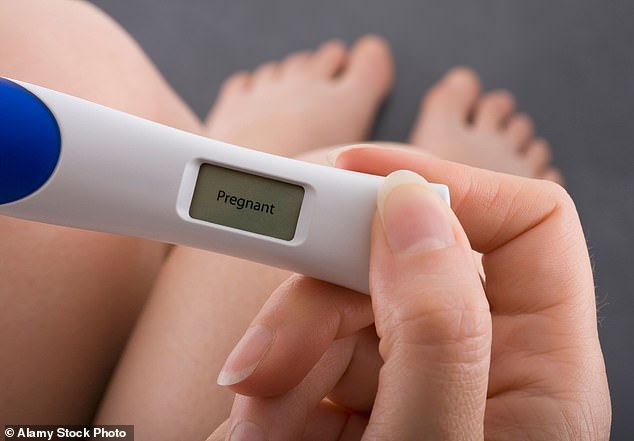Julia had a positive pregnancy test. But it wasn’t because she was pregnant… and now doctors want to warn other women about the sinister causes
Having not had a period in three months and having gained some weight around her waist, Julia Champion convinced herself that she must be in menopause at the age of 53.
‘I wasn’t particularly happy with my bloated stomach but decided I would cut back on calories and exercise more when I had the time,’ says Julia, now 55, a publicist from Sydenham, south-east London.
But during a three-hour drive to Suffolk in the summer of 2022, Julia had to stop five times to use the toilet.
“A few times I didn’t even make it to the gas station and had to stop the car and run into the bushes,” she says.
‘My sister Jenny and cousin Carrie were with me and said they had noticed that I had been peeing more than usual lately. Carrie said it could be a sign of diabetes and that I should go to the doctor for a check-up.’
Julia Champion was left speechless when her GP told her she was pregnant at the age of 53
Julia made an appointment for the following week and within 24 hours of taking a urine and blood sample she received a call from the practice.
“They said my results were in and I could come to the operating room as soon as possible to discuss them, which immediately made me worry it was something serious,” says Julia, who is married to Matt, 54, a businessman , and two teenage daughters.
Julia was completely unprepared for what her doctor told her. “She said, ‘The good news is that you don’t have diabetes and it’s not a thyroid problem, but you’re pregnant,’” Julia recalls.
‘I was stunned. For a few seconds I couldn’t say anything. Then I said, “I can’t be pregnant, I’m 53!”
‘The GP nodded and said, ‘It’s not as unusual as you think.’
According to the Office for National Statistics, more than five women aged 50 and over gave birth every week between 2018 and 2021.
“Matt and I didn’t use birth control because I didn’t think I could get pregnant again,” says Julia. ‘I was shocked, but if I’m completely honest, I was also a bit excited.
‘My daughters, Rosie and Bella, are now 18 and 15 and although Matt and I had agreed not to have another child, I had always wanted more.’
Julia went straight back home and told Matt the news. “He was so shocked and very worried that we couldn’t afford a third child,” she says. Since Julia hadn’t had her period in months, her doctor sent her for an ultrasound to see how far along the pregnancy had progressed, which brought even more surprises.
After running the tube over Julia’s stomach, the sonographer said she was just having an obstetrician come by.
“Then they said, ‘Can you jump out of bed and take another pregnancy test?'” says Julia.
‘They gave me a stick to pee on and a few minutes later the result was negative.

She had a positive test, but further investigation revealed the real problem
‘I was told I wasn’t pregnant but that I had a large cyst on my ovaries which was putting pressure on my bladder. That explained why I was peeing so much and gaining weight.”
Instead of preparing for a baby, Julia had to prepare for surgery the following week to remove the cyst.
“I have to admit, part of me was disappointed that I wasn’t going to have another baby, and I was a little upset.”
Ovarian cysts (also called tumors) are surprisingly common – according to the Royal College of Obstetricians and Gynecologists, about 10 percent of women will need surgery to remove one at some point – and they can cause positive pregnancy tests (another cause of false positive cysts). pregnancy tests is menopause, but more about that later).
That’s because certain ovarian tumors, including benign teratomas like Julia had, which develop from cells in the ovary’s eggs, can release human chorionic gonadotropin (hCG) – “the hormone that can produce a positive pregnancy test,” explains Dr. Sangeeta out. Khinder, an obstetrician and gynecologist at the private London Gynecology Clinic and Whittington Health NHS Trust.
This hormone is usually released by cells from the placenta during pregnancy, but levels can also increase in women with ovarian cysts, or who are taking medications, including certain antidepressants and, perhaps less surprisingly, fertility drugs, Dr. Khinder adds . This can cause confusion, as the resulting rise in hCG can stop menstruation, as the hormone encourages the uterine lining to thicken in preparation for a baby and signals to the body to prevent the lining from being shed, such as that is the case with menstruation.
“I’ve had young women who miss a period and then have an ultrasound done before pregnancy, but it shows an ovarian tumor instead,” says Dr. Khinder.
‘About 8 percent of menopausal women may also experience a positive pregnancy test, either in the presence of a cyst or even randomly.
‘This is because when you go through menopause, estrogen and progesterone levels drop and this has a negative feedback on the pituitary gland, which releases a small amount of hCG in return – but it’s enough to cause a false positive pregnancy test. give.’
Dr. Khinder adds: ‘We see women in their 50s getting pregnant and usually it’s IVF or sometimes spontaneous, but it’s not what I would call normal.’
Typical symptoms of an ovarian cyst include bloating, pelvic pain, a swollen abdomen, urinary symptoms such as frequency and incomplete emptying, change in menstrual periods and pain during sex.
Sometimes they can grow up to 12 cm in size and press on the bladder, making you feel full and look pregnant.

Now 55, Julia thought the lack of periods two years ago was part of menopause
Dr. Khinder advises women with such symptoms to ask for an ultrasound. ‘If these cysts are left they can grow and the concern is that they will twist and cause acute pain or cause the ovaries to die due to reduced blood supply.’
In premenopausal women, the risk of these cysts turning into cancer is one in 1,000; for women over 50 it is three in a thousand.
‘Allowing them to grow will not increase the risk of it becoming cancerous, but we usually recommend removing cysts if they are large or causing symptoms,’ adds Dr Khinder.
Julia had surgery three days after her ultrasound to remove the cyst, which turned out not to be cancerous. A biopsy taken during surgery also ruled out endometrial cancer, the forms of which can also cause a rise in hCG levels.
Although her surgery ended her urge to go to the toilet and bloating, Julia suffered heavy bleeding afterwards.
“The following week I experienced the toughest period of my life,” she says. “I called to see a friend and she had to give me some incontinence pads because I couldn’t stop the bleeding.”
Dr. Khinder says such bleeding can occur after removing a cyst.
‘The hormone hCG stops your period, so if the cyst that the hCG creates is removed, you are likely to bleed heavily if you are pre-menopausal,’ she says.
Julia was advised to have a Mirena coil fitted, which releases the hormone progesterone in the uterus to thin the lining and reduce bleeding.
“It was agony to put it in, but I’ve been fine since.”
She has been warned that there is a 4 percent risk of the cyst returning, but this time Julia knows what to look out for.
She says: ‘I was sad not to be a mother again, but I know it’s probably for the best.’
